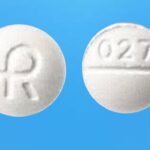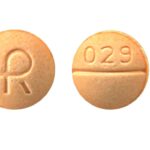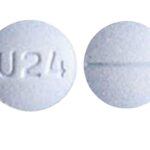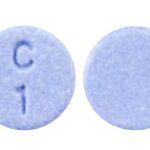EP 906 2 Pill: Uses, Dosage, Side Effects, Addiction, Warnings
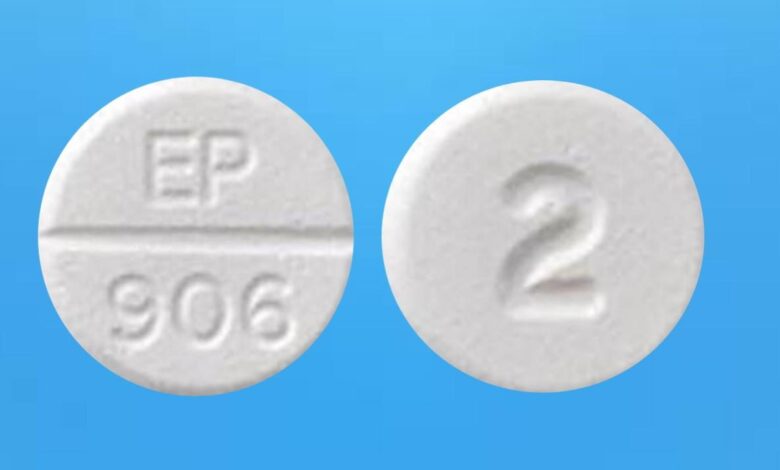
The white round pill with the imprint EP 906 2 has been identified as Lorazepam 2 mg supplied by Major Pharmaceuticals Inc.. Lorazepam belongs to the class of medications called benzodiazepines. EP 906 2 pill is used for the short-term relief of the symptoms of excessive anxiety. It works by slowing down the communication between the nerves in the brain (i.e., the central nervous system). Some people experience some improvement in anxiety about half an hour after taking EP 906 2 pill.
Your doctor may have suggested this medication for conditions other than those listed in these drug information articles. If you have not discussed this with your doctor or are not sure why you are taking this medication, speak to your doctor. Do not stop taking this medication without consulting your doctor.
Do not give this medication to anyone else, even if they have the same symptoms as you do. It can be harmful for people to take this medication if their doctor has not prescribed it. Lorazepam 2 mg is classified as a Schedule 4 controlled substance under the Controlled Substance Act (CSA).
How should I use EP 906 2 pill?
Anxiety: The recommended starting dose of lorazepam for adults is 2 mg per day, given in divided doses. The dose is individualized according to your specific needs and response to the medication. This dose can be increased by your doctor to as high as a total of 6 mg per day in 2 to 4 divided doses.
If you are taking the sublingual tablets, place the tablet under the tongue. The medication will dissolve in about 20 seconds. You should not swallow for at least 2 minutes to allow the medication to be absorbed into the body.
Many things can affect the dose of medication that a person needs, such as body weight, other medical conditions, and other medications. If your doctor has recommended a dose different from the ones listed here, do not change the way that you are taking the medication without consulting your doctor.
It is important to take this medication exactly as prescribed by your doctor. If you have been taking this medication regularly, do not stop taking the medication without speaking with your doctor. A gradual reduction in dose is recommended when stopping this medication to avoid withdrawal effects.
If you miss a dose, take it as soon as possible and continue with your regular schedule. If it is almost time for your next dose, skip the missed dose and continue with your regular dosing schedule. Do not take a double dose to make up for a missed one. If you are not sure what to do after missing a dose, contact your doctor or pharmacist for advice.
Store EP 906 2 pill tablets at room temperature, protect from light and moisture, and keep them out of the reach of children. Do not dispose of medications in wastewater (e.g. down the sink or in the toilet) or in household garbage. Ask your pharmacist how to dispose of medications that are no longer needed or have expired.
Who should NOT take EP 906 2 pill?
Do not take EP 906 2 pill if you:
• are allergic to lorazepam, other benzodiazepines, or any ingredients of the medication
• have acute narrow-angle glaucoma
• have myasthenia gravis
What are the side effects of EP 906 2 pill?
The following side effects have been reported by at least 1% of people taking EP 906 2 pill. Many of these side effects can be managed, and some may go away on their own over time.
Contact your doctor if you experience these side effects and they are severe or bothersome. Your pharmacist may be able to advise you on managing side effects.
o clumsiness or unsteadiness
o dizziness or lightheadedness
o drowsiness
o nightmares
o sleep disturbance
o slurred speech
o symptoms of low blood pressure (e.g., fainting, dizziness, lightheadedness, blurred vision, increased thirst, nausea)
o weakness
Although most of the side effects listed below don’t happen very often, they could lead to serious problems if you do not seek medical attention.
Check with your doctor as soon as possible if any of the following side effects occur:
o abnormal thinking (disorientation, delusions, or loss of sense of reality)
o anxiety
o behavioural changes (e.g., aggressiveness, angry outburst)
o blurred vision or other changes in vision
o confusion
o false sense of well-being
o fast, irregular heartbeat
o hallucinations (seeing or hearing things that are not there)
o inappropriate behavior
o memory problems
o muscle weakness
o signs of depression (e.g., poor concentration, changes in weight, changes in sleep, decreased interest in activities, thoughts of suicide)
o signs of liver problems (e.g., nausea, vomiting, diarrhea, loss of appetite, weight loss, yellowing of the skin or whites of the eyes, dark urine, pale stools)
o unusual bleeding or bruising
o unusual excitement, nervousness, or irritability
o unusual tiredness or weakness
Stop taking the medication and seek immediate medical attention if any of the following occur:
o breathing difficulties
o chest pain
o convulsions (seizures)
o signs of a serious allergic reaction (e.g., abdominal cramps, difficulty breathing, nausea and vomiting, or swelling of the face and throat)
o symptoms of myasthenia gravis (e.g., muscle weakness, drooping eyelid, vision changes, difficulty chewing and swallowing, trouble breathing)
Some people may experience side effects other than those listed. Check with your doctor if you notice any symptom that worries you while you are taking this medication.
Are there any other precautions or warnings for this medication?
Before you begin using a medication, be sure to inform your doctor of any medical conditions or allergies you may have, any medications you are taking, whether you are pregnant or breast-feeding, and any other significant facts about your health. These factors may affect how you should use this medication:
Alcohol and other medications that cause drowsiness: People taking EP 906 2 pill should not combine it with alcohol and avoid combining it with other medications, such as narcotic pain relievers, that cause drowsiness. Doing so can cause additive drowsiness and reduced breathing, as well as other side effects, which can be dangerous.
Allergic reaction: Some people may develop a serious allergic reaction to this medication. Signs of an allergic reaction include a severe rash, hives, swollen face or throat, or difficulty breathing. If these occur, seek immediate medical attention.
Dependence and withdrawal: Physical dependence (a need to take regular doses to prevent physical symptoms) has been associated with benzodiazepines such as EP 906 2 pill. Severe withdrawal symptoms may be experienced if the dose is significantly reduced or suddenly discontinued. Withdrawal symptoms can include:
o abdominal cramps
o agitation
o confusion
o diarrhea
o extreme anxiety
o headache
o irritability
o memory impairment
o muscle pain
o nervousness
o restlessness
o sleep problems
o tension
o tremors
o vomiting
Reducing the dose gradually under medical supervision can help prevent or decrease these withdrawal symptoms. If you have a history of addiction or substance use problems, discuss the risks and benefits of the medication with your doctor.
Depression: People who have preexisting depression may experience emerging or worsening symptoms of depression while taking this medication. If you experience this, contact your doctor as soon as possible. People with depression should be treated with appropriate antidepressant therapy.
If you experience symptoms of depression such as poor concentration, changes in weight, changes in sleep, decreased interest in activities, or notice them in a family member who is taking this medication, contact your doctor as soon as possible.
Drowsiness/reduced alertness: People taking EP 906 2 pill should not drive a car or perform hazardous tasks until they determine that this medication does not impair their ability to perform these tasks safely. Avoid drinking alcohol, as it can increase the drowsiness effects of this medication.
Kidney function: Kidney disease or reduced kidney function may cause this medication to build up in the body, causing side effects. If you have reduced kidney function or kidney disease, discuss with your doctor how this medication may affect your medical condition, how your medical condition may affect the dosing and effectiveness of this medication, and whether any special monitoring is needed.
Liver function: Liver disease or reduced liver function may cause this medication to build up in the body, causing side effects. If you have liver problems, discuss with your doctor how this medication may affect your medical condition, how your medical condition may affect the dosing and effectiveness of this medication, and whether any special monitoring is needed. Your doctor may want to test your liver function regularly with blood tests while you are taking this medication.
If you experience symptoms of liver problems such as fatigue, feeling unwell, loss of appetite, nausea, yellowing of the skin or whites of the eyes, dark urine, pale stools, abdominal pain or swelling, and itchy skin, contact your doctor immediately.
Lung disease: If you have underlying lung disease (e.g., chronic obstructive pulmonary disease, sleep apnea), discuss with your doctor how this medication may affect your medical condition, how your medical condition may affect the dosing and effectiveness of this medication, and whether any special monitoring is needed.
Pregnancy: Taking EP 906 2 pill during the first trimester of pregnancy may result in an increased risk of certain birth defects. This medication should not be used during pregnancy. If you become pregnant while taking this medication, contact your doctor immediately.
Breast-feeding: This medication passes into breast milk. If you are a breast-feeding mother and are taking EP 906 2 pill, it may affect your baby. Talk to your doctor about whether you should continue breast-feeding.
Children and adolescents: The safety and effectiveness of using this medication have not been established for those under 18 years of age.
Seniors: Seniors may be more likely to experience side effects of EP 906 2 pill, such as sedation (drowsiness) and impaired coordination. Seniors should discuss with their doctor the risks and benefits of taking this medication.
What other drugs could interact with this medication?
There may be an interaction between EP 906 2 pill and any of the following:
o alcohol
o antihistamines (e.g., cetirizine, chlorpheniramine, doxylamine, diphenhydramine, hydroxyzine, loratadine)
o antipsychotics (e.g., chlorpromazine, clozapine, haloperidol, olanzapine, quetiapine, risperidone)
o azelastine
o barbiturates (e.g., butalbital, phenobarbital, secobarbital)
o benzodiazepines (e.g., alprazolam, diazepam, lorazepam)
o brimonidine
o buprenorphine
o buspirone
o cannabis
o chloral hydrate
o efavirenz
o general anesthetics (medications used to put people to sleep before surgery)
o kava kava
o melatonin
o methadone
o mirtazapine
o muscle relaxants (e.g., baclofen, cyclobenzaprine, methocarbamol, orphenadrine)
o nabilone
o narcotics (e.g., codeine, fentanyl, morphine, oxycodone)
o olopatadine
o pramipexole
o ropinirole
o rotigotine
o rufinamide
o scopolamine
o seizure medications (e.g., carbamazepine, clobazam, levetiracetam, phenobarbital, phenytoin, primidone, topiramate, valproic acid, zonisamide)
o selective serotonin reuptake inhibitors (SSRIs; e.g., citalopram, fluoxetine, paroxetine, sertraline)
o tapentadol
o thalidomide
o theophyllines (e.g., aminophylline, oxtriphylline, theophylline)
o tramadol
o tricyclic antidepressants (e.g., amitriptyline, clopimpramine, desipramine, imipramine, nortriptyline)
o valerian
o yohimbine
o zolpidem
o zopiclone
If you are taking any of these medications, speak with your doctor or pharmacist. Depending on your specific circumstances, your doctor may want you to:
o stop taking one of the medications,
o change one of the medications to another,
o change how you are taking one or both of the medications, or
o leave everything as is.
An interaction between two medications does not always mean that you must stop taking one of them. Speak to your doctor about how any drug interactions are being managed or should be managed.
Medications other than those listed above may interact with this medication. Tell your doctor or prescriber about all prescription, over-the-counter (non-prescription), and herbal medications that you are taking. Also tell them about any supplements you take. Since caffeine, alcohol, the nicotine from cigarettes, or street drugs can affect the action of many medications; you should let your prescriber know if you use them.

